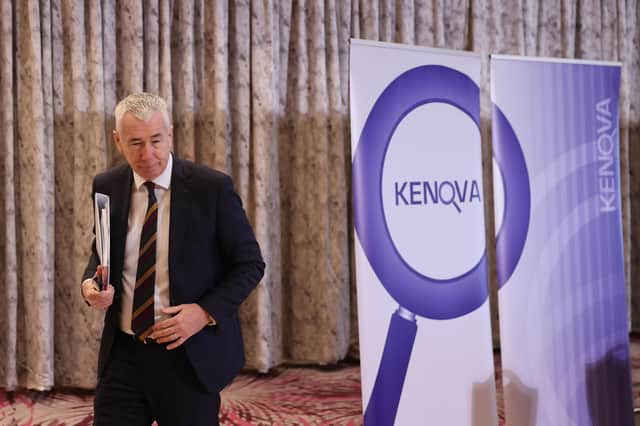Ex senior RUC officer: Jon Boutcher's claim that Stakeknife cost lives is astonishing


Having spent much of the weekend considering the ‘Interim Report’ of Jon Boutcher’s ‘Operation Kenova’, which has been eight years in the making, I would like to offer a few preliminary thoughts.
In due course other retired members of the security forces will doubtless have much to say about Mr Boutcher’s conclusions and recommendations, but in the meantime I respect his decision to avoid discussion of specific cases and will confine myself to commenting on some aspects of the ‘high level of generality’ in the report.
Advertisement
Hide AdAdvertisement
Hide AdMany will welcome the author’s recognition that he has no powers of adjudication, an admission which sits in stark contrast to public statements issued by the office of the Police Ombudsman, which required legal action to correct.


And he wisely avoids being drawn into the myth of collusion, correctly identifying that in the context of Northern Ireland legacy this must refer to substantive offences for which there is either evidence to form the basis of a prosecution or there is not. The report’s conclusions therefore represent opinions, the validity of which cannot be assessed until the factual information to support them is joined with those conclusions in one report.
The argument around the ‘Neither Confirm Nor Deny’ (NCND) policy is slightly puzzling. The report makes a plausible case for flexibility in the implementation of this policy, but also describes many occasions on which such flexibility has actually been exercised.
The suspicion is that Mr Boutcher is frustrated by directions which he has received in respect of a specific issue – and he may have a very good case – but the principle, which is designed for the protection of individuals, and ultimately the ability to gather intelligence about criminal activity, is surely worth preserving.
Advertisement
Hide AdAdvertisement
Hide AdIt is a pity that so much of the report seems to perpetuate the idea of the Special Branch ‘bubble’ (Mr Boutcher’s word) within the RUC. There is no mention of the regular briefings between regional heads of SB and CID, nor of the regular interchange of personnel, particularly at senior level, between the uniform branch, CID and SB.
And while there are frequent and generous references to ‘context’ to illustrate the difficulties under which all parts of the security apparatus worked, there is a woeful lack of appreciation of true ‘context’ when citing examples of supposed failure to act on the part of the RUC and army.
Whilst the report acknowledges that control over the exploitation of intelligence was indeed necessary and appropriate in order to protect individuals and methodology, it comes to the astonishing conclusion that in respect of agent ‘Stakeknife’, more lives were lost than were saved.
Perhaps unsurprisingly, no information to support this proposition can be provided and it may well be fair to assess that claims for the ‘productivity’ of the agent have been exaggerated. But if we are to consider ‘high level’ outcomes, should we not factor in that penetration of the terrorist organisations is widely believed to have contributed significantly to the ‘cessation’ of August 1994? How many lives did that save?
Advertisement
Hide AdAdvertisement
Hide AdI hope that in due course Operation Kenova will bring genuine comfort to the families of the victims and that retired members of the security forces will continue to offer assistance to this project. As Mr Boutcher appears both to recommend and to acknowledge, a new structure with appropriate powers may soon be in place in the form of the Independent Commission for Reconciliation and Information Recovery (ICRIR).
Finally, a thought on apologies: in respect of the events of the last 50 years, many of us have much to apologise for, not least to our children. But it is galling to most of us to read that our government should apologise for trying to save lives, albeit often unsuccessfully, and that the terrorists, in some sort of balancing act in a parallel universe of moral equivalence, should apologise for murder, torture and mass intimidation.
Chris Albiston, formerly Assistant Chief Constable, RUCGC and PSNI